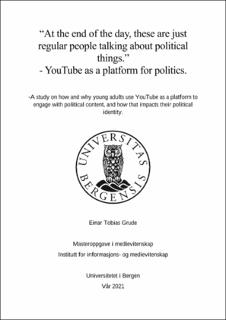“At the end of the day, these are just regular people talking about political things.” - YouTube as a platform for politics.
Master thesis
Permanent lenke
https://hdl.handle.net/11250/2761211Utgivelsesdato
2021-06-01Metadata
Vis full innførselSamlinger
- Master theses [247]
Sammendrag
This thesis explores how and why young adults in Norway use YouTube as a platform to engage with political content, and studies how this content and its producers impact their political identity. A lot has been written and said about YouTube as a political platform; a lot of it negative. YouTube has, among other things, been called “the great radicalizer,” (Tufecki, 2018). Part of my goal with this thesis is to dispel the notion frequently promoted in media that political content on YouTube is an altogether evil that leads to radicalization (Weill, 2018). Instead, I want to show how young adults can use it to create and understand their own political identity. I recruited young adults, aged 20 to 25, who all described themselves as active watchers of political content on YouTube. I interviewed them all separately over a period of a few months, then analyzed the interviews. Thirteen interviews were analyzed, in which the informants were asked to talk about their own experiences with YouTube as a platform for political content, why they followed the political YouTubers they did, and how they used the political content they watched. I wanted to explore how political YouTube could be an arena for young adults to build and better understand their own political identity. Using a reception research approach, I tried to get a better understanding of how the informants interacted with political content, and what uses it had to them. I also explored the informants’ experienced relationship with the YouTubers they watched. I discovered that young adults have a very varied concept of what a political YouTuber is, as well as a diverse understanding of why they watch political YouTubers. The most common explanation was that politics on YouTube combined entertainment with information in a way that other sources to politics rarely managed. Though a lot of my informants were now active in politics, for many of them YouTube been the entry-point into politics. YouTube had been an important tool for a lot of my informants in understanding their own political ideologies. By watching political content on YouTube, they could learn about political concepts and ideologies, and they could find political role models. These role models could play a vital part in shaping the informants’ understanding of their own political ideologies and affiliation.
